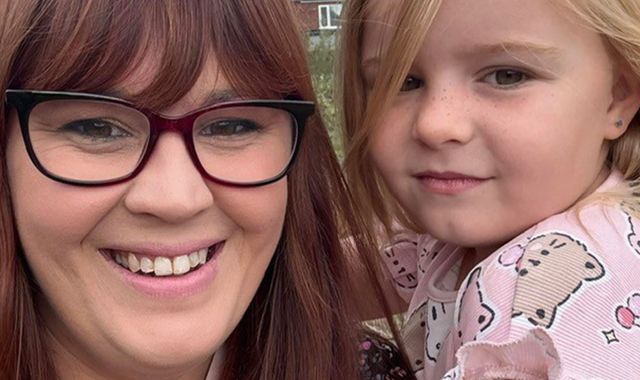
Brain cancer patients will not be able to use a new drug that slows or stops tumour growth after it was rejected for NHS use.
The National Institute for Health and Care Excellence (NICE) has turned down vorasidenib because of uncertainty in the economic data and a lack of clarity over whether the drug improves overall survival chances, according to draft guidance it has published.
Vorasidenib is for people aged 12 or over who have had surgery for types of low-grade glioma with either the IDH1 or IDH2 genetic mutations.
Current treatment includes surgery, followed by radiotherapy or chemotherapy, and patients who took vorasidenib in clinical trials reported positive results, including their tumours shrinking.
The drug, a daily pill, also delayed the time before they needed another intervention.
Taylor Pepper, 35, from Peterborough, was diagnosed with an oligodendroglioma brain tumour in 2024 following a routine eye test, which detected swelling behind her right eye.
Mrs Pepper, who is married and has a six-year-old daughter, had to stop running her business and give up her driving licence.
Surgeons at Addenbrooke's Hospital in Cambridge removed most of her tumour, but could not take it all because of its location.
Mrs Pepper joined a clinical trial of vorasidenib. The drug shrank her tumour, and she will stay on it.
"As much as I keep positive, it is very scary," she said. "But with the treatment, I know I'm in a good place.
"Being able to take this drug has given me a lot more benefits. I'm able to live a normal life and make memories with my little girl.
"It's devastating that this is a no (from NICE), because brain tumour patients have had to wait a long time for decisions on treatment anyway, so having to wait longer for a decision on this will cause a lot of stress and worry.
"They've managed to find a drug that's not as harsh a treatment as chemo and radiotherapy, meaning we're able to do so much more.
"Having a brain tumour is hard enough, especially when you're told it's incurable and that chemo and radiotherapy would only make it worse. You feel desperate.
"My last MRI scan showed a small decrease in size, which is incredible, so I want to stay on this drug as it's allowed me to carry on as normally as I can.
"Anyone facing this diagnosis should be eligible for this drug."
How common are IDH-mutant low-grade gliomas?
IDH-mutant low-grade gliomas are one of the most common primary brain tumours diagnosed in people aged under 50, and about 300 people in England would have been eligible for vorasidenib had the drug been approved.
A clinical trial on 331 patients from 10 countries found that vorasidenib slowed or even stopped tumour growth in patients with grade 2 IDH-mutant glioma.
Dawn Emerton, a trustee of Astro Brain Tumour Fund, whose son Shay received the drug, said: "I am dismayed that NICE has not made it available on the NHS.
"If NICE reverses this decision, eligible patients could experience improved quality of life, fewer seizures and delayed treatment with harsher therapies.
"It would also demonstrate the UK's commitment to innovation and provide all patients with hope for progress in brain tumour treatment."
Read more from Sky News:
Pair found dead in camper van after cider festival
Social media star to be deported from Australia
Dr Simon Newman, chief scientific officer at The Brain Tumour Charity, said: "This draft decision is very disappointing as it means more patients will have chemotherapy and radiotherapy earlier than necessary, which can be effective, but which can have significant long-term side effects.
"We are urgently asking our community to help turn this draft 'no' from NICE into a 'yes'.
"Outcomes for brain tumour patients remain among the poorest of any cancer, so we need to work with all stakeholders to ensure great science is translated into medicines that are available on the NHS as quickly as possible."

(c) Sky News 2025: 'Devastating' NHS decision on new drug vorasidenib dismays brain cancer patients


 Driverless taxis to operate on London's roads from next year
Driverless taxis to operate on London's roads from next year
 'Treat adult users like adults': ChatGPT to write erotica
'Treat adult users like adults': ChatGPT to write erotica
 Government contractor Capita fined £14m after more than six million people had data stolen in cyber attack
Government contractor Capita fined £14m after more than six million people had data stolen in cyber attack
 UK must prepare for 2C of warming by 2050, government told for first time
UK must prepare for 2C of warming by 2050, government told for first time




